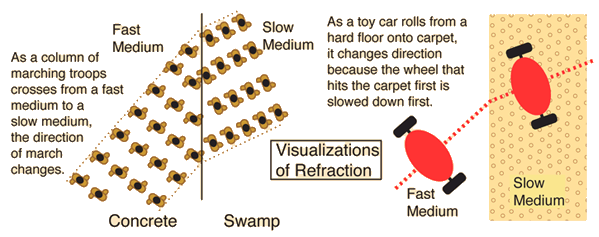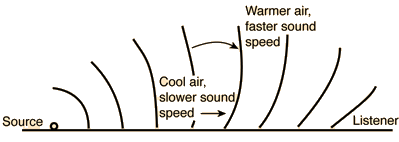Refraction of Sound
Refraction is the bending of waves when they enter a medium where their speed is different. Refraction is not so important a phenomenon with sound as it is with light where it is responsible for image formation by lenses, the eye, cameras, etc. But bending of sound waves does occur and is an interesting phenomena in sound

These visualizations may help in understanding the nature of refraction. A column of troops approaching a medium where their speed is slower as shown will turn toward the right because the right side of the column hits the slow medium first and is therefore slowed down. The marchers on the left, perhaps oblivious to the plight of their companions, continue to march ahead full speed until they hit the slow medium.
Not only does the direction of march change, the separation of the marchers is decreased. When applied to waves, this implies that the direction of propagation of the wave is deflected toward the right and that the wavelength of the wave is decreased. From the basic wave relationship, v=fλ , it is clear that a slower speed must shorten the wavelength since the frequency of the wave is determined by its source and does not change.
Another visualization of refraction can come from the steering of various types of tractors, construction equipment, tanks and other tracked vehicle. If you apply the right brake, the vehicle turns right because you have slowed down one side of the vehicle without slowing down the other.
| Refraction of light | The gar story |
Traveling wave concepts
Sound propagation concepts
| HyperPhysics***** Sound | R Nave |

